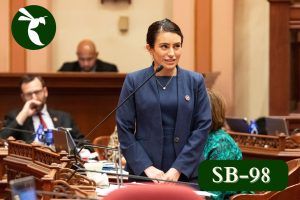Proposition information
October 13, 2004
Proposition 1A: Protection of Local Government Revenues This proposition will ensure local property tax and sales tax revenues remain with the local government. This will safeguard funding for public safety, health, libraries, parks and other local services.
Proposition 59: Public Records; Open MeetingsThis will provide right of public access to both meetings and writings of government officials. Statutes and rules furthering public access shall be broadly construed, or narrowly construed if limiting access.
Proposition 60: Election Rights of Political PartiesIf passed, this proposition will provide the right for a political party participating in a primary election for partisan office to also participate in the general election for that office.
Proposition 60A: Surplus PropertyDedicates proceeds from sale of surplus state property purchased with General Fund monies to payment of principal, interest on Economic Recovery Bonds approved in the March, 2004 election.
Proposition 61: Children’s Hospital Projects; Grant ProgramIf approved, authorizes $750,000,000 in general obligation bonds, to be repaid from state’s General Fund, to fund grants to eligible children’s hospitals for the construction, expansion, remodeling, renovation, furnishing and equipping of the hospitals. The hospitals included are those that primarily treat children with leukemia, heart defects, sickle cell anemia and cystic fibrosis.
Proposition 62: Elections; PrimariesIf passed, voters in primary elections may vote for any state or federal candidate regardless of party registration.
Proposition 63: Mental Health Services Expansion and Funding; Tax on Incomes over $1 millionThis proposition will provide funds to counties to expand services and develop innovative programs and integrated service plans for mentally ill children, adults and seniors.
Proposition 64: Limits on Private Enforcement of Unfair Business Competition LawsAmends a variety of unfair business competition laws
Proposition 65: Local Government Funds and RevenuesRequires voter approval for any legislation that provides for any reduction, based on Jan. 1, 2003 levels, of local governments’ vehicle license fee revenues, sales tax powers and revenues and proportionate share of local property tax revenues.
Proposition 66: Limitations on “Three Strikes” Law; Sex CrimesAmends “Three Strikes” law to require increased sentences only when current conviction is for specified violent and/or serious felony. Redefines violent and serious felonies.
Proposition 67: Emergency and Medical Services; Funding; Telephone SurchargeThis proposition will provide funding for emergency personnel training and equipment, reimbursement for uncompensated emergency physician care, uncompensated community clinic care, emergency telephone system improvements and to hospitals for emergency services.
Proposition 68: Tribal Gaming Compact Renegotiation; Non-Tribal Commercial Gambling ExpansionIf passed, the governor will be authorized to renegotiate tribal-state compacts to require that tribes pay 25 percent of slot machine/gaming device revenues to government fund, comply with multiple state laws, and accept state court jurisdiction.
Proposition 69: DNA Samples; Collection; Database; FundingIf passed, this will require the collection of DNA samples from all felons, and from adults and juveniles arrested for or charged with specific crimes. This information will be submitted to the state DNA database. In addition, in five years, all adults arrested for or charged with any felony will be required to give DNA samples.
Proposition 70: Tribal Gaming Compacts; Exclusive Gaming RightsIf passed, this will require the governor to offer renewable 99-year gaming compacts to federally recognized Indian tribes.
Proposition 71: Stem Cell Research; Funding; BondsEstablishes “California Institute for Regenerative Medicine” to regulate stem cell research and provide funding through grants and loans, for such research and research facilities.
Proposition 72: Health Care Coverage RequirementsProvides for individual and dependent health care coverage for employees, as specified, working for large and medium employers. Requires that employers pay at least 80 percent of coverage cost, with a maximum of 20 percent employee contribution.
For more information on the 16 propositions on the ballot: http://calvoter.org
























































































































